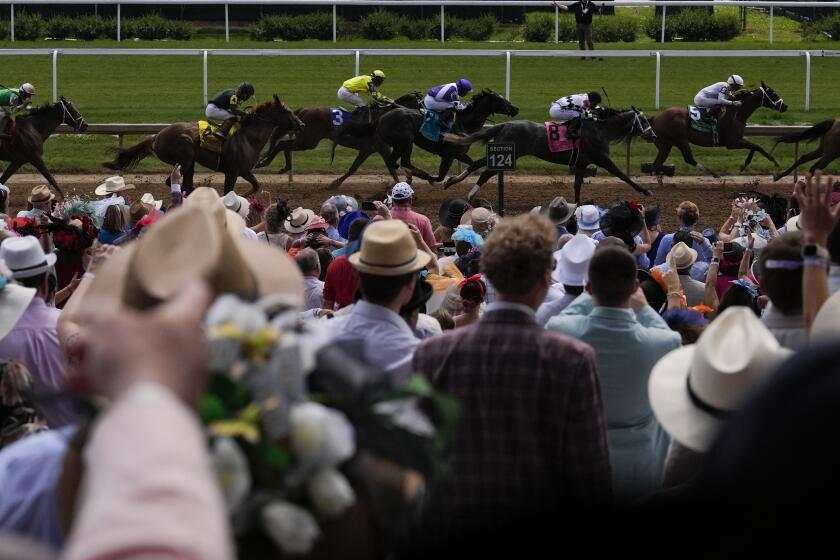Math Is Lost on Rangers
- Share via
Take a longer look at Alex Rodriguez’s contract, think things through, and two thoughts emerge from the mountain of numbers.
First, that figure of $252 million is only the beginning.
Second, this whole thing had better end with a world championship for the Texas Rangers, or else those dollars haven’t bought anything.
The $252 million breaks down like this: a $10-million signing bonus paid over the first five years; $206 million in annual payments, plus $36 million in deferred payments.
The deferred amounts range from $3 million to $5 million per season and will accrue interest at 3% annually. The deferred payments kick in from 2011 to 2020, and the interest adds an additional $12 million to the package, bringing the full value to $264 million--plus bonuses.
Although the deal is for 10 years, the Rangers don’t know for certain if Rodriguez will still be on their team in 2008. If he is around in 2009, it could be at an even higher price.
Rodriguez, 25, can opt out of the contract after the 2007, 2008 or 2009 seasons. If he does stay, a clause stipulates that in the final two years of the contract he must receive whichever is greater: a $5-million raise or $1 million more than the average annual salary of the highest-paid position player.
Since the highest average salary has quintupled in the past 10 years, it’s not too hard to imagine someone making more than Rodriguez in the next nine years.
What if another player has a similar clause? Will the two contracts keep escalating and escalating, like something out of a Dr. Seuss book?
None of the baseball personnel experts I talked to over the past couple of days could provide a definitive answer.
Meanwhile, in the back of the Rangers’ minds, they have to be fearing the worst: What if Rodriguez suffers a career-ending injury?
“Who could even insure a contract like that?” wonders San Diego Padre General Manager Kevin Towers. “Can you imagine what the premium would be on a $250-million contract? If you were an insurance company, would you insure that?”
It’s tough to find any takers. Lloyd’s of London, of course. And Hartford.
But according to Dodger Vice President Derrick Hall, “It’s getting more and more difficult.”
The Dodgers still haven’t secured insurance for the large contracts of Kevin Brown, Shawn Green, Gary Sheffield and Darren Dreifort for next season, and doing so is “no sure thing,” Hall said.
A policy on the Rodriguez contract could carry premiums as high as $5 million a year. That’s enough to buy a pretty decent shortstop. (The Rangers’ suddenly expendable Royce Clayton, for example, will make $4.5 million per year for the next two seasons.)
Then there are the incentive clauses.
If A-Rod plays as well as he expects to play--as well as this contract almost demands that he play--it will make an attendance boost financially negligible.
The Rangers drew 2.8 million fans to the Ballpark in Arlington last season. According to the Dallas Morning News, a 100,000 increase in attendance would translate into $2 million at the gate.
Let’s say 2001 is a perfect season for Rodriguez and the Rangers. If Rodriguez makes the all-star team, wins the award for most valuable player, wins the World Series MVP, collects Gold Glove and Silver Slugger awards, he would make $1 million in incentive clauses, meaning more than half of that attendance boost would go simply toward paying off A-Rod’s bonuses.
And none of it guarantees a championship. Individuals don’t have as much impact in baseball as they do in other sports, such as basketball. The Lakers made a much wiser investment when they set what was then the standard by signing Shaquille O’Neal for $121 million over seven years in 1996. And even he would not have won a championship without the emergence of Kobe Bryant.
The Seattle Mariners had Alex Rodriguez and Ken Griffey Jr. and Randy Johnson--three of the biggest stars in baseball--and they couldn’t even make it to the World Series.
Let’s take a look at the players who signed the past eight “milestone” contracts before this year:
Jose Canseco, ($4.7 million a year with Oakland); Roger Clemens ($5.4 million a year with Boston); Ryne Sandberg ($7.1 million a year with the Chicago Cubs); Griffey ($8.5 million a year with Seattle); Albert Belle, ($11 million a year with the Chicago White Sox); Pedro Martinez ($12.5 million a year with Boston); Mike Piazza, ($13 million a year with the New York Mets); and Brown ($15 million a year with the Dodgers)
What’s the common component? To date, not one of them has won a championship with the team that signed them to that contract. Sandberg has retired. Canseco, Griffey, Belle and Clemens have moved on to new teams, Clemens and Canseco winning titles with the Yankees.
Without some serious upgrades to their pitching staff, the Rangers won’t be winning a World Series any time soon.
That would make the whole A-Rod experiment as useless as an expensive losing political campaign. Didn’t those Texas folks learn from Ross Perot?
What’s the upside? Well, as a certain credit-card company might say, the experience of winning a championship would be priceless.
*
J.A. Adande can be reached at his e-mail address: ja.adande@latimes.com.
More to Read
Go beyond the scoreboard
Get the latest on L.A.'s teams in the daily Sports Report newsletter.
You may occasionally receive promotional content from the Los Angeles Times.










